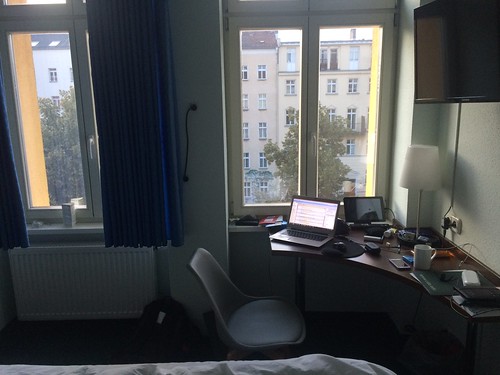I find working at home every single day, all day, staying with my Mom, in my childhood room’s home office, and not teaching this semester, extraordinarily weird. COVID-19 (“the coronavirus”) is keeping me and millions of other people in Mexico and around the world locked inside our houses to avoid contagion and break the chain of viral transmission. In my case, after months of battling psoriasis-dermatitis-eczema, this also means that I have had the mindset, time, books, articles, notes, and computer equipment to write.
FINALLY.
I feel like I have been having writing breakthroughs and I feel incredibly happy.
I also have this feeling that I have been gaining new insights into academic writing. One of the most valuable, I think and that I would like to share with my readers and Twitter/Facebook followers is to find our own voicet we should be ready and looking to write for an audience that cares, and write with enough confidence, evidence, and argumentation, that our writing can withstand scrutiny. But not only critical examination from Reviewer 2, but also, from audiences that are friendly and care about us and our development.
On a regular basis, I ask fellow scholars to scrutinize my work, and provide me with feedback.
I VERY, VERY, VERY carefully choose the people I ask for advice. If I wanted to be emotionally obliterated by Reviewer 2 on a regular basis, I would. I don’t. I like receiving eedback from people who are super smart, but also who will be kind and generous and take care of not trying to make me feel like I’m stupid. I have many people in that particular posse, and I ask them depending on the topic. For example, on global environmental politics…
… I ask @busbyj2 @StacyDVanDeveer @SJinnah2 @kmoneill2530 @charlesbroger @thomasnhale @racheltiller (just to mention a few).
These are well-respected scholars who will scrutinize my work and challenge my thinking all the while being kind and generous and sweet & constructive.
— Dr Raul Pacheco-Vega (@raulpacheco) April 11, 2020
I mentioned above the Twitter IDs of a few scholars (of the many I that I am lucky to be able to ask!) that I have requested feedback from. Here, I included some in the water and waste fields. Again, these are scholars whose research I love and admire, and who respect my work and care about me enough to provide gentle, caring and meaningful yet critical feedback:
Additional tip: when you write, write in such a way that you believe your prose could withstand scrutiny from people who care about you.
A few examples from the water & waste field: @AWutich @ProfessorJepson @meehanmonster @Prof_FSultana @STRomanoPhD @MaxLiboiron @rubbishmaker
— Dr Raul Pacheco-Vega (@raulpacheco) April 11, 2020
I find this to be both the best component of academia (having someone who will read your work with a critical eye and genuine care) and at the same time, the hardest. For newcomers into academia, students, early career scholars, it is hard to build a network. It has taken decades for me to build mine.
Finding a trible, a posse, is the challenge of modern academia, I believe. Encountering and engaging THOSE PEOPLE. Those individuals who will generously provide you with rigorous, challenging but nurturing feedback. Ideally, you should be surrounded by dozens of them, but I know this is just in an ideal world.
I am grateful that I do have my people. I can basically ask many scholars for advice, knowing that they will read my work carefully, offer constructive advice, call my bullshit if they see it, and challenge my evidence, assumptions and argument. Obviously I am more than happy to do this for them as well.
I think that being able to be scrutinized generously and kindly and rigorously starts with YOU being that person. Providing comments that are helpful and supportive.
That’s something I like about #AcademicTwitter, #MHAWS #AcademicChatter, #PhDChat and other online communities
— Dr Raul Pacheco-Vega (@raulpacheco) April 11, 2020
Folks are willing to engage with your work generously (generally speaking).
This is very important if we are to transform academia from within.
Let’s do this.




0 Responses
Stay in touch with the conversation, subscribe to the RSS feed for comments on this post.